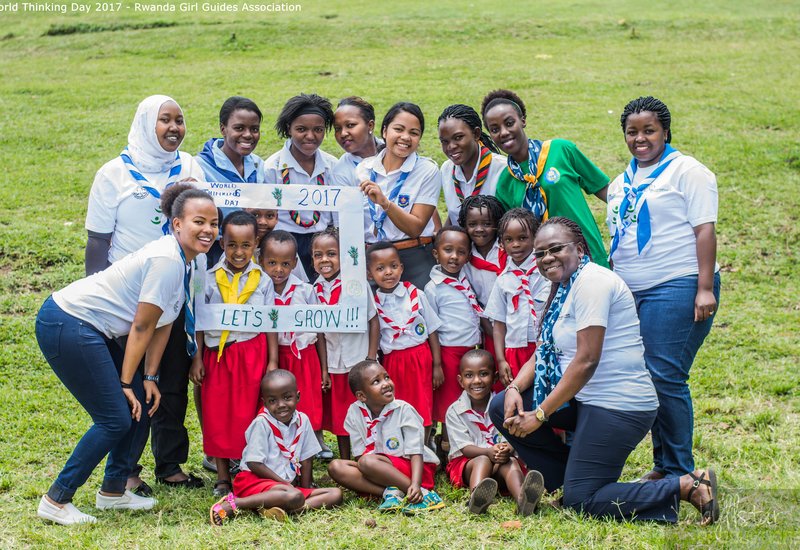History of the Girl Guides of Rwanda
Guiding in Rwanda began in 1962 with the help of members of the Guides Catholiques de Belgique, but, due to lack of support from local leaders, interest in the Movement dwindled after independence later that year.
In 1967 Guiding was revived as a branch of the Scout Association. The Girl Guides set up their own organization, the Fédération des Guides du Rwanda, in 1972, with a small team responsible for administration.
The Federation was composed of two Associations, the Association des Guides Catholiques and the Association des Guides Protestantes. A proposal was made in 1974 to form a single association, and the first National Assembly accepted this idea two years later.
In 1977 the Constitution was accepted at a general meeting, a permanent national team was appointed, and a work plan was drawn up. The Association des Guides du Rwanda (AGR) received official government recognition in 1980.
Unfortunately, many Rwandan girl guides were killed during the 1994 Tutsi Genocide, and obviously, the organization's infrastructure was destroyed. Thanks to Pfadfinderinnenschaft St. Georg, the Guides Catholiques de Belgique and other partners, AGR resume its work in Rwanda in 1995. With the Peace Campaign (Campagne d'Action pour la Paix), the Guiding movement revived, reunited members and continued to empower girls, young women and the Rwandan community.
In 2002, AGR became a full member to the World Association of Girl Guides and Girl Scouts. Currently it has more than 15,000 active members across the country.
Association des Guides du Rwanda puts girls and young women in the lead by developing the skills required to implement their own community development strategies and practices. Our work makes girls agents of change. Across Rwanda, Girl Guides are skilled at delivering non-formal education at the core of which is the empowerment of girls to understand the way that they can achieve change in their community. This occurs across our curriculum and programming.

![]()
In addition to our day to day programme we are:
- Addressing and improving each girl’s image of her body and building resilience by rolling out Free Being Me and Action on Body Confidence - fun, interactive programs which builds body confidence and self-esteem
- Working with colleagues across the world to roll out a non-formal education program, Voices Against Violence, to support girls, young women, boys and young men to identify different forms of violence, understand their rights and to gain skills in advocacy and leadership to enable them to claim these rights and assist in ending violence against girls
- Providing leadership opportunities for girls and young women – from practicing leadership at their local Unit to heading off to the UN to be part of the WAGGGS delegation at the Commission for the Status of Women. We provide the pathways to learn and practice leadership
- Continued advocacy to raise awareness regarding issues that affect girls and young women both in Rwanda and internationally
- Increasing knowledge on Sexual and Reproductive Health (SRH) and HIV (Human Immuno-Deficiency Virus), delayed sexual debut, knowledge on money and saving through the 12+ Programme (funded by DfID through the Ministry of Health since 2013 to 2017), Speak Out Programme (a 4 year programme, funded by UK Aid Direct and implemented in partnership with ActionAid Rwanda and Faith Victory Association starting from 2018 to 2021) and Grow Up Smart.
- Preventing and fighting against harmful use of alcohol and drugs among youth in the districts neighboring Uganda, Burundi, Tanzania and DRC) under the funding of IOGT Movement since 2014 to date.
- Raising awareness about diabetes and healthy lifestyles among youth and supporting children and youth with type 1 through diabetes camps and enhanced care to the diabetes patients living outside Kigali through outreach services. This 2 year programme started in 2017 and is implemented jointly with Rwanda Diabetes Association under the funding of World Diabetes Foundation
- Offering youth vocational training opportunities that lead to economic and social development as well as to a productive and patriotic Rwandan youth generation.
![]()


